You just started seeing this great guy. You went on a few dates, and they were some of the best dates you’ve ever experienced. You’re thinking this could be serious. This could be the real deal. And then he drops the bombshell: he’s a recovering addict. Do you run away or do you take a chance on this guy who seems so wonderful?
Things You Need To Know To Date A Recovering Addict
Before you make a choice to continue or break it off, there are some important things you need to know.
Recovering Addicts Can Be Great Partners
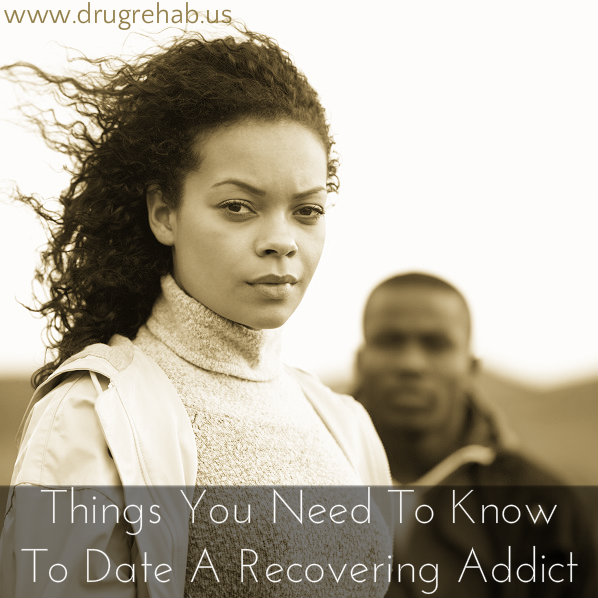 If your mind is flooding with negative thoughts and all the possible things that could go wrong in dating a recovering addict, you haven’t considered one thing: recovering addicts have been through intensive therapy. They have learned important skills for having healthy relationships, like how to communicate effectively and how to cope with stress in positive ways. Addicts in recovery have committed to sobriety and to being honest. These aren’t terrible traits to have in a partner.
If your mind is flooding with negative thoughts and all the possible things that could go wrong in dating a recovering addict, you haven’t considered one thing: recovering addicts have been through intensive therapy. They have learned important skills for having healthy relationships, like how to communicate effectively and how to cope with stress in positive ways. Addicts in recovery have committed to sobriety and to being honest. These aren’t terrible traits to have in a partner.
Addicts In Recovery Relapse
No matter how strong the commitment to sobriety, addicts in recovery are likely to relapse at least once. It’s important that you understand addiction is a chronic disease, which means that relapse is possible. Be realistic about this fact and decide if you are prepared and willing to help your partner through a difficult time. Will you be ready to support him after a relapse? Will you be able to cope with seeing him under the influence?
A Recovering Addict’s Past Is Shady
So your new guy dropped the bomb that he is an addict in recovery. That is likely to be the first of a few bombshells. He gave you the big one, and he probably won’t give you all the other details of his past right away. You will need time to process and get ready for the next. Many addicts have shameful things in their pasts. He was dependent on drugs, and he may have done other things he now regrets. Be prepared to hear that he hurt people, that he has a criminal record or that he did other bad things. Then remember that the past is in the past. He can’t change the past, but he can make amends.
Recovering Addicts Require More Support
In any relationship you need to support your partner. Your recovering addict will need more support than most partners would. He may need you to refrain from drinking around him. He may not be able to go to parties without you by his side. You may need to make allowances for him to go to meetings or therapy when you would rather do something else. Doing these things means supporting him in his sobriety. He needs this extra support to have a strong sobriety and to avoid relapse. Be prepared to give and to be more sensitive.
Love Isn’t Always Enough
Perhaps the most difficult lesson about addiction and dating is that love really doesn’t conquer all. You may fall hard for this guy and be prepared to take on his past and his recovery, but your relationship might still fail. Maybe he will relapse and become a different person, stealing from you or getting violent. Maybe you will find that the level of support he needs is more than you can give. If you are prepared for all of these possibilities, then you may be ready to start dating an addict in recovery. Remember to take care of yourself and not to lose who you are in the process of being with a recovering addict.
Are You Enabling Your Partner’s Addiction? – Learn The Signs Of Enabling & How To Stop!
12 Jan 2015
Codependents And Their Drug Of Choice…The Addict
Codependents are people who love addicts or alcoholics. While the alcoholic or addict is obsessed with his or her drug of choice, the codependent’s drug of choice is the addict. The addict is obsessively chasing his or her next high while the codependent is addicted to the drama and the challenge of bringing everything under control.
If The Addict Gets Sober It Doesn’t Mean The Problems Go Away
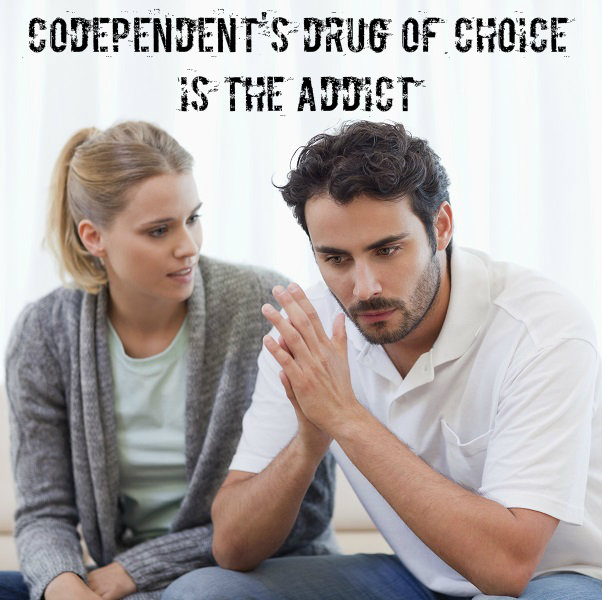 It’s not intentional, of course. If you’re involved with an addict, you probably believe with all your heart that once he or she gets sober, everything will be fine.
It’s not intentional, of course. If you’re involved with an addict, you probably believe with all your heart that once he or she gets sober, everything will be fine.
You believe the root of all of your problems is the addiction, and if the addict would only stop abusing drugs, life could go back to normal. So you keep trying to fix him.
It’s not that simple. Even if the addict gets sober, you will continue to relate to each other in unhealthy ways. In particular, you will probably continue to try to control or obsess about the addict even when he isn’t revolving his life around drugs.
Involved With One Troubled Person After Another
Many codependents find that even if they end a relationship with one addict, they immediately get involved with another one. If you have codependent tendencies, you may wonder why you seem to get involved with one addict or troubled person after another. You seem to be perpetually drawn to people who are emotionally unavailable. For one thing, thinking about them and their problems allows you to avoid thinking about your own.
Sooner or later, every codependent has to face the fact that the real problem isn’t all about the addict.
Characteristics Of Codependents
People who have a problem with codependency share certain characteristics that offer clues to why they are drawn to troubled people. Here are some of them.
- You put the needs of others before your own – Codependents are quick to put their own needs aside so that they can be constantly available to other people. The root of this tendency is low self-esteem.
- You desperately seek solutions outside yourself – Drug addicts look for substances outside themselves to fix their problems and alter their moods. As a codependent, so do you. You look for people to revolve your life around and alter your mood.
- You tend to take on too much responsibility – This leads you to do for others many things that they should be doing for themselves. You do more than your share most of the time, and eventually you feel overwhelmed and resentful.
- You have a deep fear of abandonment – You are terrified of being alone. In your relationships, you may put up with treatment that you know is unacceptable, but you are more afraid of being abandoned than you are of being abused. Being left alone is one of the worst things you can imagine.
- You constantly try to please people and you feel unappreciated – You want people to like you so much that you’re always trying to please them. You give and give and give some more, but no one seems to notice or appreciate you. You avoid asserting your own needs or getting into any kind of conflict.
- You lose yourself in relationships – You get so wrapped up in your relationships that you can barely remember who you are. You might give up your hobbies so you can be available to your loved one, or you might even change your core beliefs. Your conversations are always about what your loved one is doing, what his interests are, and what he wants. You rarely talk about yourself or think about yourself.
Recognize You Have A Problem And Get The Help You Need…And Deserve!
Codependents put a great deal of effort and energy into other people’s lives, but have a great deal of trouble focusing on their own. They get caught up in other people’s emotions, feeling happy when others are happy and sad when others are sad.
If you are a codependent, you are probably so other-focused that you don’t even realize you have a problem. Recognizing you have a problem is the first step toward recovery. Help is available through therapy and support groups such as Alanon. If you commit to getting past codependence, you will learn to focus on yourself and your own life, and to put your energy into changing what you can—yourself.
Believe In Yourself – You Are Worth It & Always Have Been…Always
18 Dec 2014
The Fight Against Stigma For Pregnant Addicts
Babies born to addicted mothers can face a very difficult start in life. When a pregnant woman is addicted to drugs and continues to use, her baby will come into this world with drugs in his or her system. A newborn who is exposed to drugs such as opiates or narcotics while in the womb will be born with a variety of problems know as neonatal abstinence syndrome.
Drugs like heroin, cocaine or oxycodone pass through the placenta from mother to baby. During pregnancy, the growing baby develops into an addict. Upon birth, the baby is immediately craving drugs, and doctors will have to give the baby drugs that are the same or very similar to the ones taken by the mother to try to ease inevitable withdrawal symptoms. Drug-addicted babies are typically inconsolable. Symptoms of neonatal abstinence syndrome can last from several weeks to several months.
In a perfect world, women who are addicted to drugs would be able to quit using before ever getting pregnant. But it’s rarely that easy to discontinue using drugs. Even when an addict knows she is pregnant and may be harming her child, the compulsion to do drugs is still there.
Difficulties Of Being Pregnant And Addicted
 It’s a growing problem, and there aren’t easy solutions. Programs aimed at helping pregnant women overcome their drug problems are often discontinued or reduced because of funding cuts. Even when programs are available to help pregnant addicts, the women are often afraid to reach out for help.
It’s a growing problem, and there aren’t easy solutions. Programs aimed at helping pregnant women overcome their drug problems are often discontinued or reduced because of funding cuts. Even when programs are available to help pregnant addicts, the women are often afraid to reach out for help.
There is a lot of stigma attached to addiction in pregnancy. Non-addicts are quick to assume that addiction is a choice, and that an addict could stop using if she really wanted to. In some states, using drugs while pregnant may even be considered a crime. In Tennessee, for example, drug use while pregnant is classified as an assault.
When a pregnant addict is arrested instead of offered help, it gives a message to other pregnant addicts that it may be dangerous to try to get help. Many try to detox on their own, which can be extremely dangerous and even life-threatening. Fear of legal consequences, such as losing custody of their other children, stops many women from reaching out for help from medical professionals. Another fear is that the newborn baby will be taken away at birth. So a large number of pregnant addicts continue to suffer in silence.
De-Stigmatizing Addiction In Pregnancy
There are few families that haven’t been touched by addiction in some way. Yet most pregnant addicts are unsure whom it would be safe to talk to, if anyone. Many of them suffer through their entire pregnancies scared and alone. They may continue to abuse drugs because it is the only life they know, or they may try to quit drugs without help, a goal that is rarely successful.
Addiction is frequently misunderstood, and often people see it as a moral failing rather than an illness. This judgmental attitude is intensified when an unborn child may be affected.
If stigma could be removed from addiction in pregnancy, both mothers and babies would benefit. If pregnant addicts were free to seek help and know they wouldn’t be judged or condemned, they could approach motherhood with strength and courage rather than fear and shame.
When pregnant addicts avoid getting help, it is really a form of denial. Addicts and their families may try to pretend that if they ignore the problem of addiction, it will go away. Pregnant addicts learn to lie to their doctors and hide any evidence that they are actively abusing drugs.
Stigma prevents addicts from obtaining good prenatal care and results in babies who are born addicted. These babies may also be born with other medical problems. Many of these problems would be prevented if the mothers were free to get help and didn’t have to live in fear of asking for it.
Few understand the hold addiction has on people and how hard it can be to overcome the compulsion to turn to mind-altering drugs. Addiction is a disease, and women who suffer from it deserve to have options for recovery without fear of stigma or judgment. So do their unborn children.
Why Do Women Continue To Drink During Pregnancy? – Understand More About Why Woman Use While Pregnant
30 Oct 2014
Tips For Dating A Recovering Addict
Dating can be tough. You meet all kinds of people in bars and clubs and maybe you meet some real strange characters in online dating as well. What happens when you meet a recovering addict? Is that a deal breaker or should you consider getting to know him better? The choice is a personal one, but before you dive head first into a relationship with a recovering addict you should be ready for what lies ahead. It could be the real deal, or it could end up being a nightmare relationship.
Realization With And Support For Your Recovering Partner
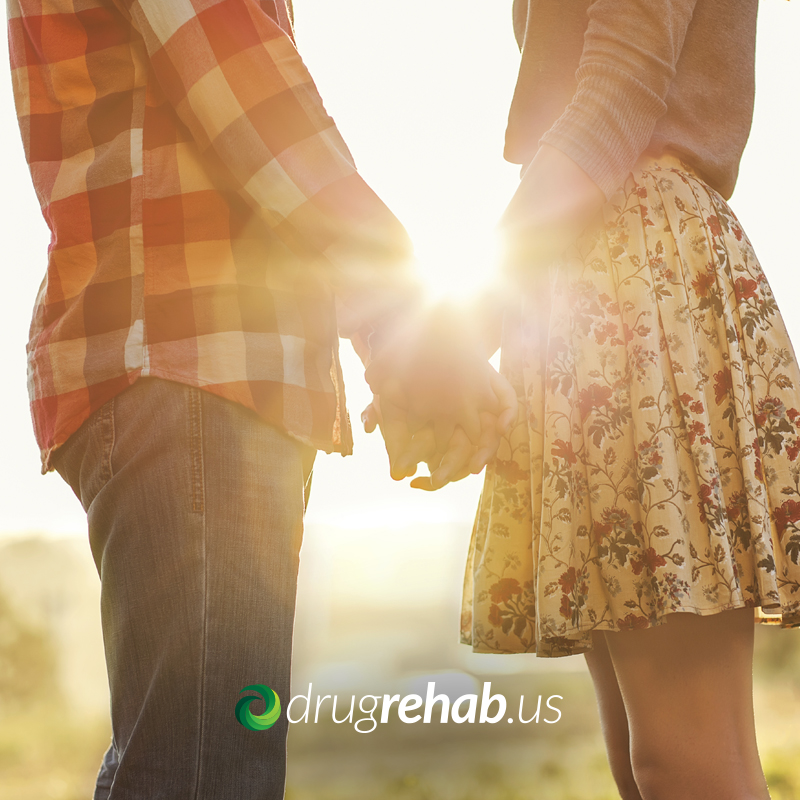 The first thing you should know about dating an addict is that he is, in fact, an addict. Addiction is a lifelong disease and even if he has been sober for years, a relapse is always possible. Also know that love does not conquer all, especially real world problems like addiction.
The first thing you should know about dating an addict is that he is, in fact, an addict. Addiction is a lifelong disease and even if he has been sober for years, a relapse is always possible. Also know that love does not conquer all, especially real world problems like addiction.
Your recovering addict partner will need your support, and as much as you love him, he will try your patience at times. Sometimes love is not enough to make a relationship work in the face of real problems. If you understand these realities and accept them, you may be ready to start dating a recovering addict.
Tips For Dating An Addict In Recovery
Here are some important tips to keep in mind as you take this journey:
- Look for honesty – The fact that someone has struggled with addiction need not be a red flag or a relationship ender. What is important is his honesty and openness. If he has been up front with you about his past struggles it shows that he has largely overcome them and is not ashamed. He has done good work and is willing to share that with you. This is a good sign.
- Be open – You also need to be open about his past. Talk about how it makes you feel and what your concerns are. He should be willing to discuss it with you and can likely allay some of your fears. Starting out on your relationship with solid, open communication will help you have a stronger partnership when times get rocky.
- Find the limits – Some recovering addicts cannot be around drugs or alcohol at all. Make sure you know whether you need to refrain from drinking in front of him and be prepared to make those accommodations if necessary.
- Learn the signs of substance abuse – Relapse is always possible, no matter how put together he seems now. Make sure you know the signs of a slip up so that you can be prepared if he relapses and starts using again. It may be obvious, but he may also be subtle about it. Try not to be over-vigilant, but do be aware of changes and what they might mean.
- Volunteer for therapy – If your partner is still attending therapy sessions or occasional counseling, be ready to join in. Offer to go along if he needs or wants you to. It may be a personal experience for him, but he might also want you to be involved. Be open to the experience.
- Take care of yourself – There will be times when dating a recovering addict is stressful for you. Being caring is important, but don’t forget to take care of yourself. Take time off to be alone and to do things that keep you happy and sane whenever you need it.
Make Sure He Meets Your Needs Too And Understand The Challenges
Dating a recovering addict is not impossible, but it may represent an additional relationship challenge. The important thing is that you find someone who meets your needs. If that person happens to be an addict in recovery, understand the unique challenges and be ready to meet them.
Learn More About Addicts And Their Excuses
23 Oct 2014
When To Cut An Addict Out Of Your Life
Knowing when to walk away from an addict in your life is difficult, but there is an appropriate time to say enough is enough. The exact timing depends on you and the addict in your life. It is a personal choice to let go of this friendship or to cut this family member out and this is one decision that only you can make.
When you have exhausted your ability to help your loved one and he still won’t make any changes or even admit to having a problem, it’s time to at least consider walking away. You can’t make anyone change. Only he can make that ultimate choice.
Reasons To Cut Addict Out Of Your Life
As you contemplate your next move, here are some important reasons to cut an addict out of your life:
- You have devoted a huge amount of time and energy trying to help your loved one, to no avail. – You’ve learned about addiction to try
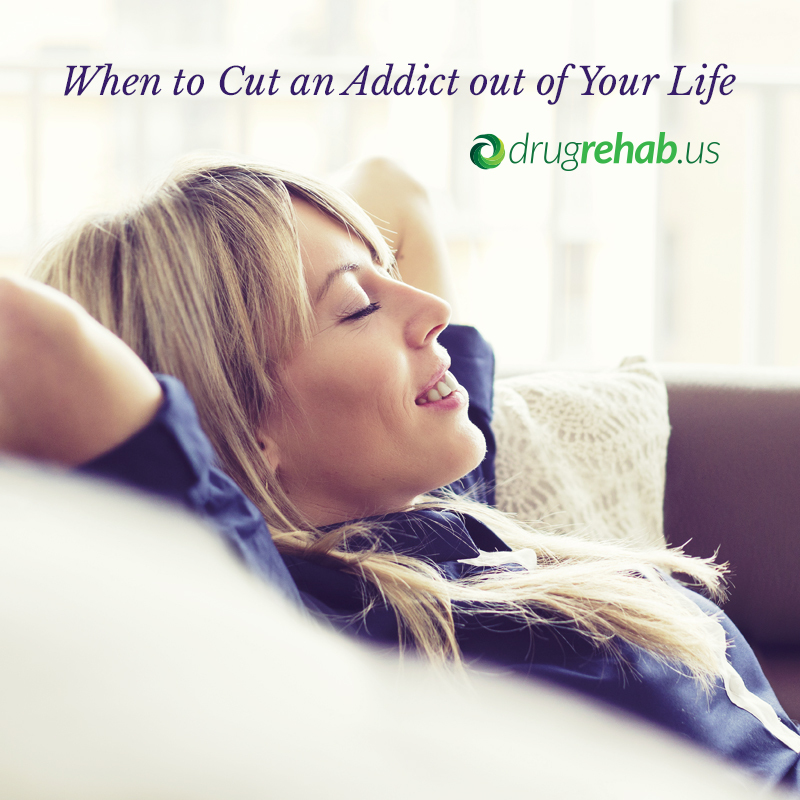 to understand what your loved one is going through. You staged an intervention and brought in a number of friends and family members to try to reach him. You spent countless hours trying to convince your friend that he has a problem and needs help. You set limits and boundaries and he continues to cross them. When your efforts are monumental and met with nothing but resistance, it may be time to move on.
to understand what your loved one is going through. You staged an intervention and brought in a number of friends and family members to try to reach him. You spent countless hours trying to convince your friend that he has a problem and needs help. You set limits and boundaries and he continues to cross them. When your efforts are monumental and met with nothing but resistance, it may be time to move on.
- Your friend has taken advantage of your charity. – It’s important for addicts to have friends and family members to support them, but when the addict still refuses to change and starts to take advantage, you have a problem on your hands. Not only is your loved one hurting you, but you have also become an enabler. Maybe he is taking your financial support, which you thought was helping him keep his apartment, and is spending it on drugs. Maybe he has stolen from you. Decide how much of this you can take and then change your locks and cut him off.
- Your loved one has become violent or frightens you. – The moment you feel your safety has been threatened, either by your loved one or his friends or acquaintances, tell him it’s over for now. Your safety should never be compromised by someone you love, no matter the situation. Take a zero-tolerance stance when it comes to violence or threats.
- Your health—emotional, physical or mental—is suffering. – Loving someone who is addicted can take a huge toll on your health. If your loved one’s situation is causing you increased levels of stress, to the point that it is causing physical symptoms, sleep loss, or other major issues, you have to consider making a change for your own well-being. You can’t help someone when you aren’t well yourself. Take time off to get better and then consider trying to help again.
Make The Decision But Offer Support If Your Loved One Gets Addiction Treatment Help
Cutting someone out of your life is a tough choice to make, but is sometimes inevitable. It’s important to try to help those you love, but you have to set limits and you have to consider yourself and your own well-being. Also know that this doesn’t have to be permanent. Tell your loved one that you are saying goodbye for now, but that if he can get his act together you will be back to fully support him in his sobriety. This should be a decision you make for yourself, but it may also turn out to be the motivation he ultimately needs to make that change.
Learn More About The Intervention Process And Steps
14 Oct 2014
Are You Addicted To Love?
Process addictions, also known as behavioral addictions, don’t always get the same kind of attention as chemical dependencies, but they can be just as serious. Love addiction, which should not be confused with sex addiction, can prevent you from having normal relationships or from ever being satisfied with one. If you are constantly obsessing over one person, a fantasy of your true love or a fantasy relationship, you could be suffering from a love addiction. It’s time to break the cycle.
What Is Love Addiction?
Love addiction is a process addiction. This means that instead of compulsively using a drug or alcohol, you are addicted to a behavior, a feeling or a person. In the case of love addiction you may be addicted to the feelings of infatuation or early love and go through a string of short-term relationships.
 Or you might be addicted to your partner and the way he makes you feel, refusing to break it off even if the relationship takes an unhealthy turn. It could even be platonic love that has you hooked. The bottom line is that you obsess over it. The feelings you get from love, infatuation and fantasy take over your life.
Or you might be addicted to your partner and the way he makes you feel, refusing to break it off even if the relationship takes an unhealthy turn. It could even be platonic love that has you hooked. The bottom line is that you obsess over it. The feelings you get from love, infatuation and fantasy take over your life.
At the root of a love addiction is the idea that another person, either real or imagined, can make your life perfect and love you unconditionally. This idea may result from a past history of being abandoned or not being loved enough. It may be that your parents didn’t meet your needs for love and affection. Now, as an adult, you have low self-esteem and look for validation from an outside source when really you should be your own validation.
How Do I Get Over A Love Addiction?
Love addiction is unhealthy because it means that you place unrealistic expectations on others, you fail to take care of yourself and you fail to develop a healthy relationship of mutual respect and love. If you recognize the signs of love addiction in your actions, thoughts and feelings, it’s time to take action and turn things around. Only then will you learn to love yourself and give yourself the chance to have a real relationship.
Steps To Get Over Love Addiction
Here are some steps to take:
- Stop, analyze and assess – Take a step back from your relationships and really think about your behaviors. Make a list of the ways in which you behave inappropriately in your relationships. Consider how you feel and how you make your partner feel. Also think about past relationships and look for common patterns.
- Take responsibility for your own happiness – As a love addict you rely on someone else to make you happy. You think that you need a perfect partner to make your life complete. This is a mistake. You are the only one who can make you happy. Accept that now and begin to act on this truth.
- Consider therapy – There is a good chance that your obsession with love is related to your past. Working with a therapist can help you come to terms with past relationships and how they have impacted you. Sometimes it takes the assistance of a professional to really heal.
- Be prepared for imperfection – As you feel ready to start up a new relationship be ready for the fact that it won’t be perfect. You can chase a perfect partner your whole life, but you’ll never find him. Prepare yourself to fall in love with someone who is imperfect, but perfect for you.
Breaking the habit of love addiction isn’t easy, but it will make your life infinitely better. Only when you begin to accept and love yourself, and reject the idea of a perfect fantasy partner, will you be ready to enjoy real love.
13 Oct 2014
Are You An Enabler?
Behind many addicts you’ll find enablers. An enabler can be a parent, a spouse or even a child, and usually her intentions are good. The problem is that loving an addict, supporting him and empowering him can often turn into enabling. When you enable the addict in your life you are only making the problem worse and preventing him from getting the help he really needs. So how do you know if you are helping or hurting?
What Is Enabling?
Enabling means taking away or covering up the consequences of your loved one’s addiction. Consequences are powerful motivators. When an addict destroys his relationships, loses his job or spends all his money on drugs he is forced to face the truth about his problem with drugs or alcohol. If you take actions to shield him from these consequences, he need not face the truth and he will likely keep doing what he is doing. You are enabling him.
Put this way it sounds pretty straightforward. When you’re in the thick of it, though, it can be tough to know if you are enabling your addict or helping him. You should help your loved one. You should empower him to get help for himself. Helping an addict doesn’t always mean tough love, but there can be a fine line between caring and enabling.
Signs You Are An Enabler
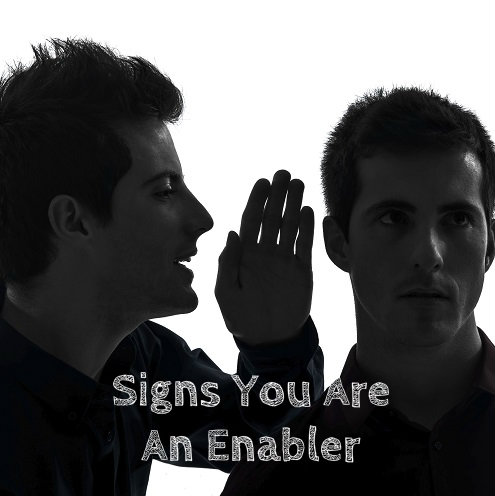 Here are some surefire signs that you are an enabler:
Here are some surefire signs that you are an enabler:
- You make excuses or lie – You cover up or gloss over bad things that your loved one is doing and make excuses to other people. For instance, you might explain away his embarrassing bender at a party by telling everyone that he was sick and the alcohol interacted badly with his cold medicine.
- You take on his responsibilities – For an addict, everyday responsibilities are usually the first thing to go south. If you pick up the slack by picking up the kids from school, doing his chores, taking care of his aging mother or anything else he is supposed to do, you are not letting him feel the consequences of his neglect.
- You put the blame for his problems on anyone but him – Addicts are great at assigning blame to third parties. It’s part of denial. You may add to the problem by encouraging this or telling him that he’s right. You may even blame yourself. The truth is that he makes his own decisions and he needs to realize that.
- You take care of him financially – Addiction costs money. Do you give him more money when he runs out? Do you pay the bills or legal fees? Helping him financially may seem unconnected to his addiction, but it isn’t.
- You avoid addressing the problem out of fear – If you are afraid to face the problem of your loved one’s addiction because you are afraid of a fight or that he will leave you, you are enabling.
How To Stop Enabling And Start Helping
If you recognize the enabler in your habits, it’s time to stop. Start with a conversation about the problem. Stop ignoring it. Tell your loved ones that things will change from now on. You will no longer take care of his responsibilities. You will no longer give him money. What you will do is support and love him. Offer to be there as he gets help or goes to rehab. Tell him and show him that you are there to help and support, but that he needs to get help. Once he starts to really feel the consequences of his addiction he will start to realize the extent of his problem.
Find Out If Are You The ‘Chief Enabler’ For An Addict – And What To Do About It
01 Oct 2014
Are You Codependent?
Codependency is a term that derived several decades ago from the term co-alcoholism. It was coined to describe the role of the spouse of an alcoholic. Today that term has evolved to head a number of symptoms of dysfunctional relationships, both those with an addict and without. A codependent relationship can exist without any type of addiction. But, if you are the partner or spouse of an addict your odds of being codependent are greater. What does this mean? And how do you know if you are codependent?
Having An Addicted Partner And Codependency
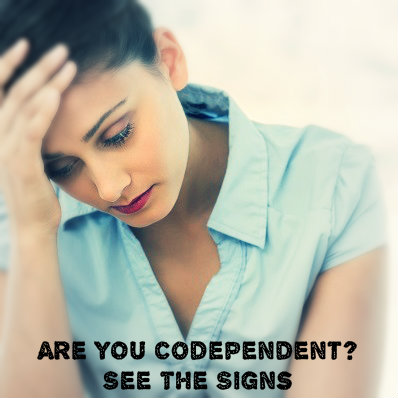 If you do have a partner addicted to drugs or alcohol, or even with a behavioral addiction, you should learn more about codependency and what it means. Your partner definitely needs treatment for addiction, but you may benefit from therapy as well. Being the partner of an addict takes its toll. A simple definition would state that being codependent means drawing your self-esteem and self-worth from your partner.
If you do have a partner addicted to drugs or alcohol, or even with a behavioral addiction, you should learn more about codependency and what it means. Your partner definitely needs treatment for addiction, but you may benefit from therapy as well. Being the partner of an addict takes its toll. A simple definition would state that being codependent means drawing your self-esteem and self-worth from your partner.
This type of dynamic often exists between an addict and their partner because of the balance they strike together. Addicts need someone to enable their habit, make excuses for them and care for them. Codependents need someone to care for and someone to need them. Together the two fit perfectly, if not healthfully.
Signs You Might Be Codependent
Are you codependent? Here are some signs that might indicate you are:
- You Have Low Self-Esteem – Codependents often have a poor sense of self-worth. They feel unworthy of love. They compare themselves to others and come up feeling inadequate. You may be good at hiding this, even from yourself, so dig deep and think about how you really feel.
- You Love To Please Others – If you are codependent, you take much of your self-worth from caring for someone else. As a result, you may be afraid to upset anyone. You can’t say no and you go out of your way to make sure others are happy, often at the expense of your own needs.
- You Ignore Warnings Signs – Problems that your partner has, like his addiction, are crystal clear to others, but you ignore them. You make excuses for his drug or alcohol use and his inappropriate behaviors. You stay in the relationship despite the fact that he is not meeting your needs.
- You Have Poor Boundaries – Codependents have a hard time setting or staying within relationship boundaries. You may have either weak or rigid boundaries. Maybe you share too much personal information or give too much of yourself. On the other hand, you may be withdrawn and unwilling to let anyone see what you’re feeling.
- You Need Control – You like to be in control because it makes you feel safe. This comes out in the form of controlling your partner, or trying to. Controlling can look like caring. Your need to please others or to care for your partner can be a form of control.
- You’re Afraid Of Being Alone – You see the issues in your relationship, but you ignore or deny them because you fear ending it. Being alone scares you because you take your sense of self-worth from your partner. You may be miserable, but you’re going to stay.
Treatment For Codependency
Codependency is not uncommon. If you see these signs in yourself and your relationship, you are far from alone. Still, this type of relationship is unhealthy, especially when one partner is an addict. Treatment can reverse codependency and help you learn to love yourself without needing someone else. Treatment can also help your partner overcome addiction. The important first step is to recognize the problem. Then you can both get help.
If You’re In A Relationship With An Addict Should You Stay Or Leave? Read More Now!


